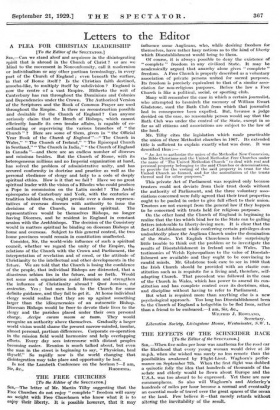THE FREE CHURCHES
[To the Editor of the SPECTATOR.]
SIR,—The letter of Mr. Martin Tilby suggesting that the Free Churches do not enjoy " complete " freedom will carry no weight with Free Churchmen who know what it is to
enjoy their liberty. It is possible however, that it may
influence some Anglicans, who, while desiring freedom for themselves, have rather hazy notions as to the kind of liberty which Disestablishment would bring to them.
Of course, it is always possible to deny the existence of " complete " freedom in any civilized State. It may be academically argued that anarchy alone gives " complete " freedom. A Free Church is properly described as a voluntary association of private persons united for sacred purposes. Its freedom is precisely equivalent to that of a similar asso- ciation for non-religious purposes. Before the law a Free Church is like a political, social, or sporting club.
Many will remember the case in which a certain journalist, who attempted to besmirch the memory of William Ewart Gladstone, sued the Bath Club from which that journalist had in consequence been expelled. But, because a judge decided on the case, no reasonable person would say that the Bath Club was under the control of the State, except in so far as all citizens and associations are subject to the law of the land.
Mr. Tilby cites the legislation which made practicable the union of three Methodist churches in 1907. Its extended title is sufficient to explain exactly what was done. It was described thus :-
" An Act to authorize the union of the Methodist New Connexion, the Bible Christians and the United Methodist Free Churches under the name of ' The United Methodist Church ' to deal with real and personal property belonging to the said Churches or denominations, to provide for the vesting of the said property in trust for the United Church so formed, and for the assimilation of the trusts thereof and for other purposes."
This private Act of Parliament was required only because trustees could not deviate from their trust deeds without the authority of Parliament, and the three voluntary asso- ciations concerned were fully agreed that their trust properties ought to be pooled in order to give full effect to their union. Trustees are not exempt from the general law if they happen to be concerned with trusts held for religious purposes.
On the other hand the Church of England is beginning to realize that the ties which bind her to the State can be galling fetters intolerable to liberty-loving men. It is clear that the fact of Establishment while conferring certain privileges does undoubtedly place the Anglican Church under the domination of the State. Yet English Churchmen take surprisingly little trouble to think out the problem or to investigate the results of Disestablishment in Ireland and in Wales. The testimonies of Welsh Episcopalians to the value of Disestab- lishment are available and they ought to be convincing to candid minds. Mr. Gladstone took care to see in 1869 that the Irish Church should be provided with an elastic con- stitution such as is requisite for a living and, therefore, self- adapting Church. That precedent was followed in the case of the Church in Wales, which has power to amend its con- stitution and has complete control over its doctrines, rites, and discipline without having to refer to Parliament.
But what is required more than anything else is a new psychological approach. Too long has Disestablishment been to the Church of England a hobgoblin to be fled from, rather than a friend to be embraced.—I am, Sir, &c., WILFRID J. ROWLAND,
• Secretary. Liberation Society, Livingstone House, Westminster, S.W. 1.












































 Previous page
Previous page